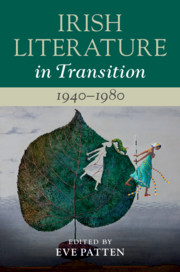Book contents
- Irish Literature in Transition, 1940–1980
- Irish Literature in Transition
- Irish Literature in Transition, 1940–1980
- Copyright page
- Contents
- Contributors
- Series Preface
- General Acknowledgements
- Introduction
- Part I After the War: Ideologies in Transition
- Part II Genres in Transition
- Part III Sex, Politics and Literary Protest
- Chapter 9 Censorship, Law and Literature
- Chapter 10 Sex, Dissent and Irish Fiction: Reading John McGahern
- Chapter 11 History, Memory and Protest in Irish Theatre
- Chapter 12 Violence, Politics and the Poetry of the Troubles
- Part IV Identities and Connections
- Part V Retrospective Frameworks: Criticism in Transition
- Index
Chapter 9 - Censorship, Law and Literature
from Part III - Sex, Politics and Literary Protest
Published online by Cambridge University Press: 28 February 2020
- Irish Literature in Transition, 1940–1980
- Irish Literature in Transition
- Irish Literature in Transition, 1940–1980
- Copyright page
- Contents
- Contributors
- Series Preface
- General Acknowledgements
- Introduction
- Part I After the War: Ideologies in Transition
- Part II Genres in Transition
- Part III Sex, Politics and Literary Protest
- Chapter 9 Censorship, Law and Literature
- Chapter 10 Sex, Dissent and Irish Fiction: Reading John McGahern
- Chapter 11 History, Memory and Protest in Irish Theatre
- Chapter 12 Violence, Politics and the Poetry of the Troubles
- Part IV Identities and Connections
- Part V Retrospective Frameworks: Criticism in Transition
- Index
Summary
This chapter reflects on the implications of censorship for writers working after 1940, first, by questioning the extent to which its imposition hampered the expression of a modern literary generation, and second, by exploring the strategies through which it was sidestepped and transgressed by both writers and readers in this period. It considers both the cultural implications of domestic censorship for Irish writers between 1940 and 1980, and the means that existed for circumventing the policing of ‘foreign’ literature. It highlights the pervasive effects of censorship across the middle decades of the century. First, the focus is on Kate O’Brien, Seán O’Faoláin and Frank O’Connor, all born before independence, who found themselves directly at odds with the country they had seen created. Faced with the banning of their own books, they battled to resist official strictures of their work. It then considers a subsequent generation of writers – including Edna O’Brien, Leland Bardwell, John Montague, John McGahern and Julia O’Faoláin – born during a period in which censorship had already become embedded within Irish literary culture. Finally, this chapter concludes by examining the experience of Colm Tóibín, who grew up in the 1950s, when censorship was still a dominant force.
- Type
- Chapter
- Information
- Irish Literature in Transition, 1940–1980 , pp. 169 - 184Publisher: Cambridge University PressPrint publication year: 2020



